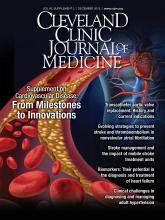ABSTRACT
Stroke prevention in patients with nonvalvular atrial fibrillation relies on an assessment of the individual risks for stroke and bleeding. Patients at high risk for stroke are candidates for anticoagulant therapy. Anticoagulants, however, have substantial bleeding risks that must be weighed in the therapeutic decision. Warfarin has been the traditional choice, but the recently introduced novel oral anticoagulants offer similar efficacy with less bleeding risk. Additionally, they do not require monitoring and have fewer drug interactions and dietary restrictions than warfarin. Several devices, which isolate the left atrial appendage, have become available as treatment options for patients with elevated risks of both thromboembolism and bleeding complications.
- © 2015 The Cleveland Clinic Foundation. All Rights Reserved






